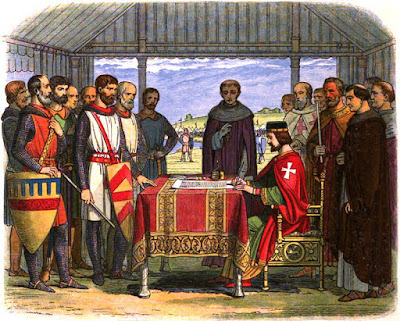The Magna Carta (Latin for "the Great Charter") was a document containing 63 clauses signed by King John of England after negotiations with his barons and their French and Scots allies. It was sealed at Runnymede, a broad riverside meadow, near Windsor, on June 15, 1215.
It was the Archbishop of Canterbury Stephen Langton, who drafted the Magma Carta. Once exiled by King John, Langton was a theological genius with a particular interest in what the book of Deuteronomy had to say about equality before the law, even for kings.
The charter established a council of 25 barons to ensure John kept to the 63 clauses that included the protection of church rights, protection for the barons from illegal imprisonment, access to swift justice, and limitations on feudal payments to the Crown, The charter gave the Barons more power and is the foundation of England's liberty.
King John appealed to Pope Innocent III a month after sealing the Magna Carta, arguing that the charter compromised the Pope's rights as John's feudal lord. The Pope agreed, denouncing it on August 24, 1215 as "not only shameful and demeaning but also illegal and unjust."
In its original version, Magna Carta lasted only three months before King John violated its terms. In 1225, a new version was issued by Henry III which became the definitive version.
Originally the Magna Carta was known as the Charter of Liberties. It became Magna Carta when a smaller Charter of the Forest was issued in 1217.
The Magna Carta was originally written in medieval Latin. and then translated into French, which was the world language of the ruling classes. It was not issued in English until over 300 years later.
In modern English translation, the Magna Carta has 4,922 words. The United Nations Universal Declaration of Human Rights has only 1,833.
Versions in English were much longer – and abbreviated to save on expensive calfskin vellum.
The Magna Carta included the first English legislation to control the proper measures of beer, wine and spirits.
The original Magna Carta was written on parchment made from dried sheepskin. Thirteen original copies of the Carta were made and distributed. Only four survive today. The four copies are in The British Library (two), Lincoln Castle and Salisbury Cathedral.
One of the four surviving copies, written on dried sheepskin in Latin, was discovered in a London tailor’s shop in the 16th century.
The only copy in private hands was sold at auction in 2007 for $21.3 million (£15 million).
The importance of the Magna Carta was not accepted until centuries later. Shakespeare did not mention it in his Life and Death of King John.
Just three of its 63 clauses still apply today – including the right to a fair trial
Magna Carta has influenced English law down to the present day. It is one of the most celebrated documents in English history. It is recognized as a cornerstone of the idea of the liberty of citizens.
Source Daily Express.
It was the Archbishop of Canterbury Stephen Langton, who drafted the Magma Carta. Once exiled by King John, Langton was a theological genius with a particular interest in what the book of Deuteronomy had to say about equality before the law, even for kings.
The charter established a council of 25 barons to ensure John kept to the 63 clauses that included the protection of church rights, protection for the barons from illegal imprisonment, access to swift justice, and limitations on feudal payments to the Crown, The charter gave the Barons more power and is the foundation of England's liberty.
 |
| The Magna Carta |
King John appealed to Pope Innocent III a month after sealing the Magna Carta, arguing that the charter compromised the Pope's rights as John's feudal lord. The Pope agreed, denouncing it on August 24, 1215 as "not only shameful and demeaning but also illegal and unjust."
In its original version, Magna Carta lasted only three months before King John violated its terms. In 1225, a new version was issued by Henry III which became the definitive version.
 |
| A romanticized 19th-century recreation of King John signing the Magna Carta |
Originally the Magna Carta was known as the Charter of Liberties. It became Magna Carta when a smaller Charter of the Forest was issued in 1217.
The Magna Carta was originally written in medieval Latin. and then translated into French, which was the world language of the ruling classes. It was not issued in English until over 300 years later.
In modern English translation, the Magna Carta has 4,922 words. The United Nations Universal Declaration of Human Rights has only 1,833.
Versions in English were much longer – and abbreviated to save on expensive calfskin vellum.
The Magna Carta included the first English legislation to control the proper measures of beer, wine and spirits.
The original Magna Carta was written on parchment made from dried sheepskin. Thirteen original copies of the Carta were made and distributed. Only four survive today. The four copies are in The British Library (two), Lincoln Castle and Salisbury Cathedral.
One of the four surviving copies, written on dried sheepskin in Latin, was discovered in a London tailor’s shop in the 16th century.
The only copy in private hands was sold at auction in 2007 for $21.3 million (£15 million).
The importance of the Magna Carta was not accepted until centuries later. Shakespeare did not mention it in his Life and Death of King John.
Just three of its 63 clauses still apply today – including the right to a fair trial
Magna Carta has influenced English law down to the present day. It is one of the most celebrated documents in English history. It is recognized as a cornerstone of the idea of the liberty of citizens.
Source Daily Express.
No comments:
Post a Comment